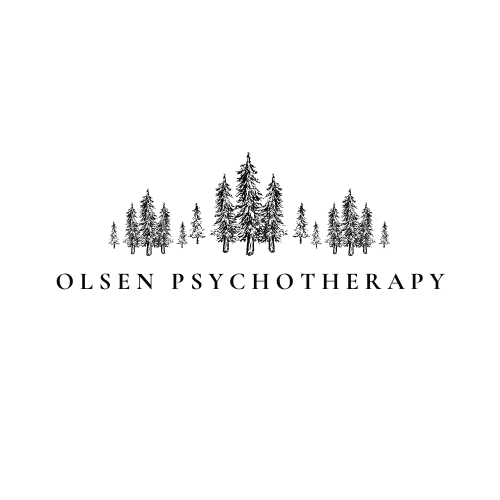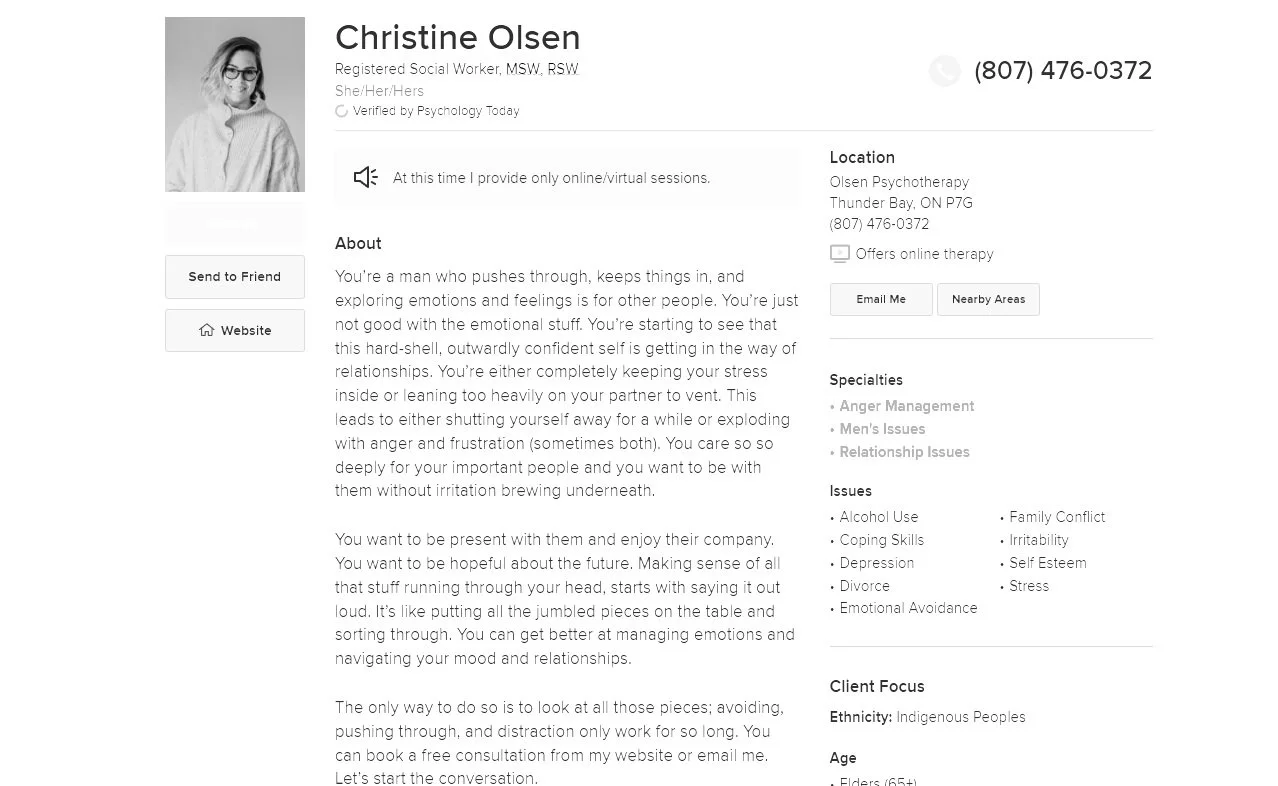How to find a therapist in Ontario
If you are one of the many people in Ontario looking for a therapist I do not envy you. I find it difficult to navigate as a therapist, so if the mental health world is fairly new for you it can be even more frustrating to find what you need. Finding a therapist in Ontario is not a clear cut system. I am here to share what I know so you go into your search with some direction.
What you’ll find in this article:
PART 1 - Where to look when finding a therapist in Ontario
Therapist Directories
Non-Insured Health Benefits (NIHB)
Employee-assistance Program (EAP)
Google Search
Social Media
Asking others
PART 2 - What to look for when finding a therapist in Ontario
Specialties or areas of interest
Modalities or approaches
Fees and coverage
Qualifications
Other questions to consider
Where to look when finding a therapist in Ontario
Therapist Directories
Therapist directories are a common source for finding a therapist in Ontario. Basically, you have a list of different therapists that have provided information about themselves and their practice in their profile; It’s kind of like the therapist yellow pages. Then you get to sort through to find the best match.
Tips for searching therapy directories in Ontario:
1. Filter your search
Certain locations may have pages and pages of therapists to look through (in Ontario, think Toronto… there's a lot). Filtering your search so you get a list of therapists that can meet your needs will help you avoid looking at a whole bunch of not good match therapists for you. Most directories are going to get you to search for your location, but there will be options to specify further. For example:
Individual, family, or couples therapy
Therapist gender
Adult, child, teen
Types of issues like anxiety, parenting, or anger management
Insurance or fees
Types of therapy like Emotion Focused Therapy (EFT), Cognitive Behaviour Therapy (CBT), or EMDR
Faith-specific support
LGBTQ+ affirming
Languages spoken by the therapist
Online or in-person therapy
Search the items that are most important to you to find in your therapist and go from there. I say most important because if you specify your search TOO much you may not have anybody. Find a few items in the search bar that you see as deal-breakers in your therapist search.
2. Search in different locations
This is for people open to or looking for online therapy. If you are on a directory where it’s mandatory to search within a certain city, just change to a different city within Ontario. Other therapist directories may have the option to search Ontario-wide. This may be a good opportunity to get more specific with those filter options to weed out any less-good therapist fits.
3. Look at specialities
Many therapist directories allow therapists to specify their top specialities. These are issues that the therapist feels most competent in helping you with and often it’s where they are most passionate.
4. Learn the lingo the best you can
This may be one of the most frustrating parts of searching for a therapist in Ontario. Therapist directories may use language that people in the mental health world understand, but are less commonly understood by those searching for a therapist. SO if you’re looking to filter your search and don’t come across the issue you are looking for help with, it may help to google a few terms from the filtered search box to see if it fits for your issue.
Common directories used when searching for a therapist in Ontario:
If you recommend any others, please share in the comment section on the bottom of this page.
Directories by Ontario & Canadian associations
Association-based databases are ones where the therapists are affiliated or accredited with the association. Not just anyone can be listed; A therapist will have to meet certain requirements to list there. For example, the Canadian Association of Marriage and Family Therapy (CAMFT) only lists therapists who are Registered Marriage and Family Therapists (RMFT).
If you want your Ontario therapist to be certified in something specific or have a preferred type of therapy you like, this is a great way to ensure you are getting that. My list is not exhaustive by any means, so a search with: “[insert issue] therapist” is a quick way to see if there is an association for that thing. Here are examples of therapy databases for associations or certifications where you can search for a therapist in Ontario:
Canadian Association for Marriage and Family Therapy (CAMFT)
The Gottman Method (for couples)
Eye Movement Desensitization and Reprocessing (EMDR) - EMDR Canada
Emotion Focused Therapy (EFT) - The International Centre for Excellence in Emotionally Focused Therapy (ICEEFT)
Dialectical Behaviour Therapy - DBT Linehan Board of Certification
Dialectical Behaviour Therapy Prolonged Exposure Protocol (DBT PE)
Internal Family Systems Therapy - (IFS) Institute
Sex Therapy - Board of Examiners in Sex Therapy & Counselling in Ontario
If you recommend any others, please share in the comment section on the bottom of this page.
Non-Insured Health Benefits (NIHB)
If you are a First Nations or Inuit person, coverage is available under Non-Insured Health Benefits for mental health counselling. The contact information below is the client information line that can help direct you to providers that are approved under Non-Insured Health Benefits (NIHB).
Telephone (toll free): 1-800-640-0642
Some therapist directories in Ontario may have this as an option when filtering your search. Another way is contact a local Indigenous organization that may have NIHB counsellors or else be able to recommend some providers, like Indigenous Friendship Centres.
Employee Assistance Program (EAP)
These are programs commonly used in Ontario by employers to give you access to and coverage for counselling. The employer has contracted professionals for this program, like a local mental health agency or their own curated list of therapists, to provide the service. Check with your employer to see if this exists.
Advantage: You are covered and the therapist options are provided.
Disadvantage: You are limited to a specific agency or your employer’s list if you happen to be looking for something more specific.
Google search
Googling “therapist near me” may be your first instinct here and it actually might work. What you’ll find is likely the more popular counselling centres near you, as those websites get the most traction. This may be exactly what you need.
Another approach is to get more specific. If you want a “therapist near you” or “therapist online ontario” but know the specific issue you want help with, then your search might yield better results with more specificity.
For example: “couples counselling thunder bay” or “anger management therapy barrie” or “eating disorder therapist ottawa”. Play around with this and you may see different therapists in Ontario pop-up.
Even searching for a specific issue or asking a question may bring up information to lead you in the right direction. What I mean is, information pages or blogs that talk about your specific issue may pop up when typed in, like “Why do I feel angry all the time?” or “grieving loss of spouse”. The algorithm will put the most visited and digital footprinted site first, but you may see blogs from therapists in Ontario talking about your specific issue. Adding “ontario” at the end of that search may help as well.
Therapists on social media
More and more therapists are using social media in Ontario to advertise their services. Think Instagram, Tiktok, Facebook, and even Pinterest. As a therapist who uses social media myself (See me on Instagram @olsen.psychotherapy), I am biassed, yet I can share why I find it such a useful tool for those trying to find a therapist in Ontario. The main reason why I say social media for finding a therapist in Ontario is a good tool is:
You get to know the therapist before you choose the therapist.
Many therapists choose to go beyond posting a graphic and actually talk to the camera or make videos showing their personality. This is a great way to see if you jive with them instead of reaching out and starting therapy and being disappointed that they are obviously not the therapist for you.
It is also great for building confidence in starting the process. Getting to know more about a therapist and their practice in this format may be the thing you need to feel more confident to reach out.
Also, social media allows you to see other creative ways the therapist communicated their specialty. You may see video, diagrams, tips and tricks, and even options to ask general questions ex. stories, comment sections, lives.
Tips for searching social media for an Ontario therapist:
Hashtags would be my recommendation in finding a therapist in Ontario. Now, the algorithm may already be showing you different therapist accounts if you are a consumer of mental health content normally. Aside from that, try out different hashtags like.
#onlinetherapyontario #anxietycounselling #thunderbaytherapist #postpartumdepressiontoronto.
Remember, therapists are only licensed or regulated to provide therapy in certain provinces and states. If you find a therapist’s content you like, but they are not in your service area, you could reach out to them to see if they know of other therapist accounts in your area via direct messaging, or if they do question and answers in their stories.
If you’re lucky enough, they may even send out a mass inquiry on their account for a therapist in your area with that speciality (that’s what I would do at least).
For Facebook…
Searching in the search bar is probably your best bet using “therapist [insert city or province]” then sorting through the results. Not my favourite way of finding a therapist in Ontario, but you may be lucky enough to find a good page where the therapist shares regularly.
For Pinterest…
Same idea. Search bar. The downside is that Pinterest is a less popular place for therapists in Ontario to share content, so you’ll see less options for therapists in general and specific to the issue you want to talk about in therapy.
Ask around
Friends or family
Do you have a friend who has gone to therapy and can help you navigate? They may even have a friend of a friend who saw a therapist in Ontario they would recommend. Doesn’t hurt to ask.
Former therapist
This may be a weird one, but if you have gone to therapy previously, asking your last therapist who they recommend is an option. They might not have been a good fit or you are looking to talk about a specific issue they don’t specialise in. For example, you saw them for individual therapy and you want couples therapy. So reach out and see if they have a few names for you to check out.
Health professional
If you are already working with another health professional in Ontario, they may have heard of or know therapists they can vouch for. For example, your gynaecologist or lactation consultant may know a great therapist who specialises in postpartum depression. As well, many doctor offices have health teams that are multidisciplinary. This means your family doctor for example may have a social worker or therapist providing services in the same office building.
Therapy Apps
I am not going to elaborate on how to find a therapist on therapy apps. I mean the kind that offer online therapy, texting, or phone with these large companies/mental health startups that have dominated results in our search efforts to find a therapist in Ontario.
The reason is that I have heard too much feedback from fellow therapists. Pay is not equivalent to experience being asked of therapists, most of which are master’s level clinicians. Therapists become burnt out and as a result less able to provide effective therapy because when you make so little you have to work many more hours. I can’t support that.
Additionally, because these apps are so new, legislation and protective measures have not kept up. Think of all the information shared on apps in general, and the personal content you would provide when accessing an app for mental health support. Your information is gathered and not protected in the way it would be if you accessed a therapist-led service or mental health organization. It’s on this app, so you sign away information because nobody reads the long winded policies and fine print (understandably) - and also, what does it all mean!? It’s unethical practice and I hope very soon our government or regulatory bodies catch up so clients can be more protected.
What to look for when finding a therapist in Ontario
Here are topics to consider that will help you narrow down your search and give you greater insight into what is a good fit for you. These may be preferences you have for what you look for in a therapist or parameters that are outside of your control that you need to know when searching for a therapist in Ontario.
Specialities or areas of interest
The therapist may call these specialities, or simply “services”, but it is the topics that they list they can help with. The therapist has identified particular experiences or issues that they are knowledgeable about. Under their regulatory body (where they are regulated or licensed to practice psychotherapy) they will have requirements for them to be sufficiently knowledgeable in order to be advertising this.
You may come across therapists who are “generalists”, which means they help with many issues and don’t have a short-list of things they help with.
You may ask: Does this mean they can’t help me? Not necessarily. Every therapist has a different scope of knowledge. This means therapists can’t know everything about every topic someone is coming to therapy for. Even for generalists, they will have topics that are beyond their ability to know and help with despite not identifying specific issues they specialize.
For example, I do not practice family therapy, but I have completed courses in the topic and would feel competent helping a client navigate family conflict if they brought it to therapy. If a client wanted help for their eating disorder however, I would not be knowledgeable enough to ethically help with this and need to refer out to another therapist or hire a supervisor who is an eating disorder therapist.
What I would advise: If the therapist’s website or other marketing is unclear on their experience with your issue, ask them if they have worked with someone who has had your issue or has additional training in that area.
Modalities or approaches
Psychotherapy is practised using theory and modalities. This means the approach your therapist uses is guided by a theory of how people behave and why, and how they heal or change. Modalities then provide specific interventions and approaches that are grounded in those theories. Examples of a modality are Cognitive Behaviour Therapy (CBT) or Narrative Therapy (NT).
There is research to support effectiveness of most modalities, but some with more or less. This is for many reasons, some of which are: how long the therapy has been around, interest of popularity in the type of therapy, who gets funding to do research, and how easy or difficult it is to prove effectiveness through modern research models. Should this matter to you as a therapy-seeker? Maybe or maybe not. The professional you use to provide therapy is required by their regulated body to provide evidence-based interventions. They must provide therapy that is grounded in theory and modalities that have enough evidence to show they are not harmful.
One question you may want to consider if speaking to your therapist about their approach is whether their modalities are effective for the issue you are coming to them with. For example, there are some therapy modalities that have a stronger evidence-base for certain ailments, like Obsessive-Compulsive Disorder (OCD).
Remember that there are MANY theories, modalities, and approaches for providing therapy. If you go to therapy and your therapist uses Cognitive Behavioural Therapy (CBT) and you find it’s not helpful, try a therapist that practises Narrative Therapy (NT) and see if that fits. To further explain: I do not provide EMDR therapy and I am not interested in it as a client, but I have suggested it to someone close to me because I thought it would be a good fit for them. Our personalities, and how we develop and change is unique, which will make some approaches in therapy a better fit.
Fees & coverage
Government-funded Psychotherapy
Unfortunately in Ontario, Ontario Health Insurance Plan (OHIP) does not cover psychotherapy or counselling services unless provided by a medical doctor. Seeing as most doctors are not providing this service this coverage makes little sense. Those in Ontario are still having to pay out of pocket to get mental health counselling and therapy support other than a few exceptions.
Extended health benefit plans
Extended health benefit plans, which rarely (I’ve never seen it) provide full coverage for your sessions. You will likely see your sessions with your therapist in Ontario be covered for a certain amount per session per year. For example, your therapist may charge $150, but coverage under your extended health benefit plan is $50 and you are only covered in TOTAL for $500 per year.
Also, make sure if you use your plan that your therapist is licensed or regulated under a profession covered by your plan. For example, your plan may cover psychotherapy or counselling by a psychologist or registered social worker, but not a registered psychotherapist or registered nurse, even though those professions are allowed to practise psychotherapy in Ontario.
Employee Assistance Program (EAP)
Always check to see if your workplace has an Employee Assistance Program too. They will already have providers you can use and it’s covered. Always check out what the limits to that coverage are.
Non-Insured Health Benefits (NIHB)
If First Nations or Inuit, you can be covered under Non-Insured Health Benefits. This coverage is way more realistic. As of February 2023 it looks like 22 hours per year of mental health counselling and option to apply for additional coverage if it runs out. Remember to ask if your therapist takes this benefit as payment, and whether they require pay upfront or they submit for you.
No or low cost options
Don’t worry too much though if you are not in a financial place to spend. There are options for finding a therapist in Ontario with no or low cost. There are community mental health agencies, multidisciplinary health services (like in a hospital or doctor office), or cultural or religious organisations that can provide therapy or counselling in Ontario at no cost. This is because they may have government grants or funding that they’ve applied for, supported by a charity, or have alternative revenue streams that make this possible.
Sliding Scale
In private therapy practices, some therapists may have a “sliding scale”, which is fees that can “slide” from their regular fee to accommodate those who have financial strain. Some therapist directories like Psychology Today or the actual therapists’ websites will specify this.
Low Cost Directory
Most directories for Ontario therapists will have a fee range option when searching. Feel free to use this in your search.
Personally, I use Open Path Collective for low fee counselling spots. This is a therapist directory that has a fee to sign-up that is good for a life-time. Then you have access to therapists who offer therapy in a fee range set by the site. Of course, there are requirements to be in a financial situation that makes paying for therapy more difficult, like not having other coverage. Check out their site for more information.
Qualifications
Therapists will only be able to practice where they are licensed and regulated. This means if you find a therapist in British Columbia that you want to do online therapy with, but you live in Ontario, you will not be able to access their services unless they for some reason are also licensed and registered with an Ontario regulatory body. Even then, regulatory bodies will differ on whether there is restrictions for providing services if the therapist is living outside the province.
Also, there are only certain licensed and regulated professions in Ontario that are able to practise psychotherapy; These professions are:
Registered Social Workers (RSW) or Registered Social Service Workers (RSSW) - Ontario College of Social Workers & Social Service Workers (OCSWSSW)
Registered Nurses (RN) - College of Nurses of Ontario (CNO)
Occupational Therapists (OT) - College of Occupational Therapists of Ontario (COTO)
Registered Psychotherapists (RP) - College of Registered Psychotherapists of Ontario (CRPO)
Medical Doctor (MD) - College of Physicians and Surgeons of Ontario (CPSO) (psychiatrists are medical doctors and fall under this category)
Psychologists (C.Psych) or Psychological Associates (C.Psych.Asso) - College of Psychologists of Ontario (CPO)
Level of education will vary from college diploma to PhD for these professions.
“Therapy” vs. “psychotherapy”
You’ll notice that I have repeatedly used the term “therapy”. This is commonly short-hand for “psychotherapy”.
It can get muddy though because other professions may use “therapy” like physical therapy or massage therapy, that is not short-hand for “psychotherapy”.
Generally speaking, when people use the short-hand “therapy” when speaking about mental health care, they are referring to “psychotherapy” and only certain professions are able to provide that service and call themselves a “psychotherapist”. This is because “psychotherapy” is considered a controlled act under the Regulated Health Professions Act, 1991 (RHPA) due to the risk of harm for clients if performed by an unqualified person.
Whatever Ontario therapist you choose, please check their licence or registration number to ensure they are professionally able to provide psychotherapy.
YES, fraudulent service providers actually exist (see here Ontario woman charged after allegedly providing unlicensed therapy at Whitby clinic | CTV News).
To check whether a therapist is licensed or regulated you can visit the sites under which the professional is licensed and search their name to confirm (links above).
“Psychotherapy” vs. “counselling”
The terms “psychotherapy” and “counselling” are often used interchangeably. This is because there is overlap. Here is the definition that the Ontario College of Social Workers & Social Service Workers (OCSWSSW) provides:
“Psychotherapy services are defined as ‘any form of treatment for psycho-social or emotional difficulties, behavioural maladaptations and/or other problems that are assumed to be of an emotional nature, in which a College member establishes a professional relationship with a client for the purposes of promoting positive personal growth and development.’ Counselling services are defined as ‘services provided within the context of a professional relationship with the goal of assisting clients in addressing issues in their lives by such activities as helping clients to find solutions and make choices through exploration of options, identification of strengths and needs, locating information and providing resources, and promoting a variety of coping strategies, but do not include psychotherapy services.’”
- Practice Guidelines for Performing the Controlled Act of Psychotherapy p. 5
Click to read more of this article from the OCSWSSW website.
It is important to understand that “psychotherapy” is a protected act and “psychotherapist” is a protected term, but the term “counselling” and “counsellor” is not for the province of Ontario.
This means that there may be services that provide “counselling” but are not licensed or regulated professionals providing therapy. They may be competent professionals providing counselling, it’s just that there are no parameters on who can or cannot provide mental health counselling services. An option is to ask: “What is your background, training or schooling that has prepared you to offer counselling services?”
Further, someone can call themselves an expert or specialist, like Grief Expert or Grief Specialist, and have no schooling or training at all because certain terms are not protected, meaning only certain professionals can use them. Your “grief specialist” may be someone with lots of their own personal experience with grief and choose to use this term to provide support to others, and you might not mind that they do not have professional qualifications. That is okay, as long as you are aware and that person is not providing support outside of their understanding and training.
That is why if you are looking for regulated or licensed professionals, to always ask for their license or registration number or look up their name on the college or licensing website associated with their profession (see above list).
Other questions to consider when looking for a therapist in Ontario:
Do you provide in-person or online services?
Are you LGBTQ-affirming?
Do you have experience working with someone of my race, ethnicity, or cultural background?
What are your appointment hours?
Do you have requirements for how often appointments must be? (Ex. Weekly, bi-weekly, monthly).
Can I bring a support person to my first session?
Does your building have a ramp or elevator?
Do you diagnose mental health conditions?
Have you completed additional training recently to maintain your competency?
What is your approach to therapy? What can I expect?
Do you have experience providing therapy for my specific issue?
Can I make appointments on an emergency basis?
Do you have a free consultation?
Which forms of payment can I use?
What can I expect in your waiting room?
Is there any other questions for a therapist you can think of? If so, add your advice in the comment section.
Balancing wants vs options.
What I mean by balancing wants and options is: What is most important? You may not check every box when looking for a therapist in Ontario. Understand what your parameters are that are out of your control; For example, I can afford [this much]. Also, understand what the most important preferences are; For example, I want a LGBTQ+ affirming therapist and that’s non-negotiable. OR I want in-person therapy, but if they’re LGBTQ+ affirming I will consider online therapy.
Lastly, good luck in your search. Therapy can be just the thing you need to help you through a hard time and/or be completely life-changing. I hope this information provided you direction in where to look and what to look for.
Disclaimer: This is general advice. Like all self-help information, it is not personal and tailored to fit for all people and situations. This content should not be taken as a substitute for individual mental health or relationship support.
I have used information that is available at this point in time (February 2023) and some of which has been guided by personal experience as a clinician in the mental health system. If you see any information I have missed or been misinformed about in this Blog, please share in the comment section and I will do my best to update promptly.
Also, please share if you have been a therapy-seeker in Ontario and have found a therapist in ways you think other therapy-seekers might benefit from.















